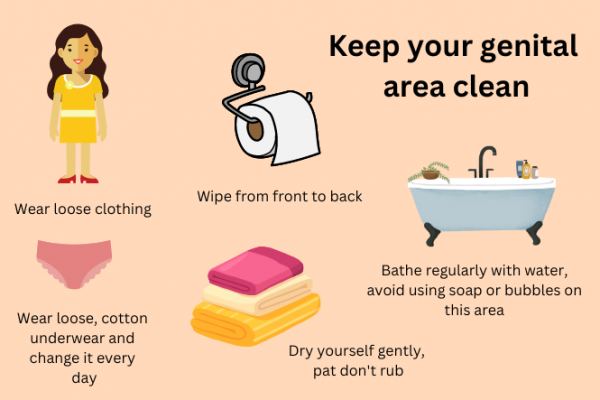Vaginal thrush is caused by an overgrowth of a yeast called Candida albicans in 90% of cases. It's normal to have Candida in your vagina and most of the time it doesn't cause any problems. However, sometimes certain factors disrupt the natural balance and the pH of your vagina, causing the Candida to multiply resulting in overgrowth (usually of one specific type of candida). This can cause inflammation of the skin, and an irritated rash to appear. Up to 3 out of 4 women will have at least 1 episode of thrush in their lifetime.
Vaginal thrush is sometimes called candidiasis, a vaginal yeast infection or vulvovaginal candidiasis.
Low or no data? Visit zero.govt.nz, scroll down the page then click on our logo to return to our site and browse for free.
Vaginal thrush | Mateīhi
Also known as candidiasis or a yeast infection
Key points about vaginal thrush
- Vaginal thrush (mateīhi) is a common yeast infection that will affect most women at some stage in their life.
- Common symptoms include vaginal irritation and itching, change in discharge and pain.
- It's most commonly caused by an overgrowth of a yeast called Candida albicans (with associated inflammation).
- Vaginal thrush isn't considered a sexually transmitted infection.
- It usually clears up within a week of treatment with antifungal medication. This is available at your pharmacy or on prescription from your doctor.
- For some women, vaginal thrush is more difficult to treat and tends to reoccur quite frequently, despite treatment.

Vaginal thrush can affect women and girls of all ages, but it's rare before puberty or after menopause. Your risk of getting vaginal thrush increases if you:
- are pregnant
- have a history of sexually transmitted infections (STIs)
- have recently been on a course of antibiotics or steroids
- have diabetes and your blood glucose is not under good control
- use a type of hormonal birth control that has higher doses of oestrogen
- have a weakened immune system, such as from chemotherapy or immunosuppressants
- have a skin condition such as eczema or dermatitis
- experience vaginal dryness during sexual intercourse – this can cause irritation of the skin
- wear tight fitting clothes that may irritate the vulval area
- use vaginal deodorants, sprays, gels and wipes, perfumed bubble baths, douches or other products that can change the natural acidity of your vagina.
For some women, vaginal thrush tends to reoccur quite frequently. If you experience 4 or more vaginal thrush infections per year, this is called recurrent vaginal thrush. Read more about recurrent vaginal thrush below.
Symptoms of vaginal thrush include:
- itching, irritation or redness around your vagina and vulva
- burning or stinging when urinating (weeing)
- vaginal discharge – this can be thick and white or thin and watery, without any smell
- swelling and splits in the skin
- pain during sex.
Some people have no symptoms and thrush may be picked up when having a test for something else. It's not necessary to have treatment when you have a swab that shows candida are present, unless you're having symptoms that bother you.
The signs and symptoms of vaginal thrush can be the same as the symptoms of sexually transmitted infections (STIs) and bacterial vaginosis. These conditions can increase your risk of getting other STIs and can lead to problems getting pregnant. So, if you are not completely sure that it's thrush, see your healthcare provider to make sure you get the correct diagnosis and treatment.
You can access treatment for thrush at a pharmacy, so you don’t necessarily need to see your healthcare provider if you've been diagnosed with vaginal thrush before, and your symptoms are exactly the same as last time. However, if you find that the treatment isn’t working, or you are having repeated episodes of thrush (more than twice in 6 months), you do need to see your healthcare provider.
Sometimes symptoms of vaginal thrush may be due to another condition and it's often hard to tell for sure. See your healthcare provider if you're not sure or if you have symptoms of vaginal thrush and you:
- are having symptoms for the first time
- are under 16 years or over 60 years of age
- are pregnant
- have treated yourself with a thrush treatment from the pharmacy, but your symptoms haven't gone away
- have a history of, or are concerned about, sexually transmitted infections
- have any of the following vaginal symptoms:
- discoloured or strong-smelling discharge
- lower abdominal pain or vaginal bleeding that is not your period
- ulcers or blisters next to your vagina
- vaginal thrush symptoms that have not settled despite appropriate treatment
- vaginal thrush symptoms more than 4 times in a year
- vaginal thrush symptoms plus other symptoms such as fever, tiredness or nausea.
Antifungal medicines are the best treatment for vaginal thrush. They come in a few different formulations, eg, vaginal creams, pessaries (tablets you insert into your vagina) and capsules that are swallowed (fluconazole). The choice of treatment and the dose will depend on things like:
- whether your symptoms are mild or severe
- how often you get vaginal thrush
- whether you are pregnant
- whether you have any other medical issues (eg, impaired liver function)
- whether you're taking other medicines that may interact with antifungal medicines.
The following measures have not been shown to help:
- Special low-sugar, low-yeast or high-yoghurt diets.
- Putting yoghurt into the vagina.
- Probiotics.
Thrush doesn't cause long-term damage to your vagina and it doesn't spread to damage your womb (uterus). There's no evidence that having thrush while you're pregnant will cause harm to your unborn baby. However, if you have thrush while you're pregnant it's best to get it treated as there may be a link between thrush and pre-term birth – studies into this are ongoing.
If you have thrush when you are giving birth, it may be passed on to your baby. If this happens you will be given advice on how to treat it.
Sex when you have thrush
You can still have sex when you have vaginal thrush. However, it can be uncomfortable and you may experience a burning sensation during or after sex. Use plenty of lubricant to protect your skin and reduce the discomfort. Thrush can also pass to the mouth during oral sex. Read more about oral thrush here.
Use barrier forms of contraception (eg, condoms) to avoid passing thrush to your partner.
Some vaginal creams can weaken condoms, so apply the treatments after you have had sex if you are using condoms, or use a different form of contraception.
Will my partner need treatment?
It’s possible to pass thrush to your partner during vaginal, oral or anal sex. However, your partner only needs to be tested (and treated) if they have symptoms.
The best way to prevent vaginal thrush is to identify what triggers it. If you get recurrent vaginal thrush and are unsure what is causing it, discuss your symptoms with your healthcare provider. They can investigate the underlying causes and suggest ways you can manage it. It may also be helpful to use a calendar diary to track your periods and sexual contact as well as your thrush symptoms. Read more about recurrent vaginal thrush below.
Things you can do to ease discomfort and prevent vaginal thrush returning:
- Dry the affected area properly after washing.
- Wear loose cotton underwear and avoid tight clothing.
- Always wipe from the front (vagina) to the back (anus) after toileting.
- Use only water-based lubricants.
- Use soap substitutes such as water-based emollients.
- Consider changing your laundry detergent.
- Ensure your blood glucose level is kept under control if you have diabetes.

Image credit: Healthify He Puna Waiora
Avoid the following:
- Avoid using soap to wash your genital area.
- Avoid irritants such as deodorants, talcum powder, bubble bath solutions, deodorised panty liners or vaginal douches.
- Avoid spermicidal condoms.
- Avoid fabric softeners.
For some women, vaginal thrush can occur quite frequently, despite treatment. If you experience 4 or more vaginal thrush infections per year, this is called recurrent vaginal thrush. About 5–10 of every 100 healthy women experience recurrent vaginal thrush.
Who is at risk?
Repeated vaginal thrush infections are more likely in women who:
- have diabetes and their blood glucose level is not well controlled
- use antibiotics often
- are pregnant
- are on long-term oral steroid treatment (such as prednisone) and immunosuppression (such as chemotherapy)
- have iron deficiency
- are taking oestrogen, including the combined oral contraceptives or hormone replacement therapy
- have a sexual partner who has untreated thrush
- have another infection at the same time (eg, bacterial vaginosis or STIs)
- have a candida infection that's resistant to antifungal medicines.
Treatment
If you have recurrent vaginal thrush, see your healthcare provider. They will need to do a vaginal swab and get it tested to see what treatment is best for you.
- Your healthcare provider may recommend using antifungal vaginal creams for a longer course, such as 10–14 days or for a few months. In some women, this may cause irritation or contact dermatitis.
- For some women, using a vaginal antifungal cream or pessary before and after menstruation can prevent recurrent symptoms.
- Your doctor may prescribe oral antifungals such as fluconazole for a few months.
- There's no evidence that the use of probiotics (such as Lactobacillus acidophilus or other probiotics) is helpful in treating vaginal thrush. There's also no evidence of harm with their use.
Read more about how vaginal thrush is treated above. Even if you take medicines, it's important to use self-care measures to reduce your risk of recurring infections.
Apps reviewed by Healthify
You may find it useful to look at some Women's health apps.
Thrush (candida)(external link) HealthInfo, NZ
Understanding your vaginal swab results(external link) HealthInfo, NZ
Vulvovaginal candidiasis(external link) DermNet, NZ
Thrush in men and women(external link) NHS Choices, UK
Vaginal candidiasis(external link) CDC, US
Thrush in pregnancy(external link) NHS, UK
Apps
References
- Vulvovaginal health in premenopausal women(external link) BPAC, NZ
- Vaginal and vulval infections(external link) NZ Formulary, NZ
- Thrush(external link) NHS, UK, 2021
- Vulvovaginal candidiasis(external link) DermNet, NZ
- Candidiasis(external link) Aotearoa New Zealand STI management guidelines for use in primary care, NZ
- Treating recurrent yeast infections (external link) (Note: graphic image) PatientInfo, UK
- Vulvovaginal health in premenopausal women (Note: graphic image) BPAC, NZ
- Vaginal and vulval infections NZ Formulary, NZ
- Vaginal discharge management guideline summary(external link) Sexual Health Society, NZ, 2017
- Vulvovaginal health in premenopausal women(external link) (Note: graphic image) BPAC, NZ, 2011
- Vulvovaginal health in post-menopausal women(external link) BPAC, NZ, 2014
- Vaginal and vulval infections (external link) NZF, NZ
- The Infectious Diseases Society of America’s Clinical Practice Guidelines for the Management of Candidiasis(external link) CDC, US, 2016
- CDC – 2021 sexually transmitted infections treatment guidelines – vulvovaginal candidiasis(external link) CDC, US, 2021
- National guideline for the management of vulvovaginal candidiasis(external link) British Association for Sexual Health and HIV, UK, 2019
- Candidiasis(external link) (Consultation draft) Australian STI Management Guidelines for use in primary care. Australia, 2021
Apps
Credits: Healthify editorial team. Healthify is brought to you by Health Navigator Charitable Trust.
Reviewed by: Dr Phoebe Hunt, Medical Officer, Northland
Last reviewed:





